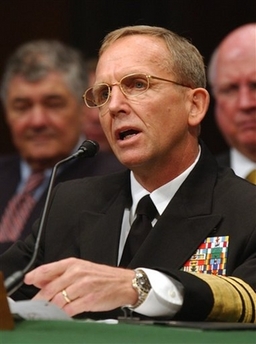Admiral: Bureaucracy hampers terror war
(AP)Updated: 2007-06-13 10:44
WASHINGTON - Two years after the nation's commando forces were given broad authority to attack terrorist networks, the elite units remain hampered by uncertainty over coordination, says the admiral chosen to head the US Special Operations Command.
The command's "ability to drive behavior within (the Defense Department) is limited due to unclear definition of authorities," Olson said in a written response to a question from the Senate Armed Services Committee.
The response was made public Tuesday as the committee met to consider Olson's nomination to run the command, which is based at MacDill Air Force Base in Tampa, Fla.
Olson's brief answer indicates President Bush's March 2005 decision to broadly empower US commandos continues to be a source of friction within the military's hierarchy.
Most of the disagreement comes from other war-fighting commands responsible for managing operations across wide but specific stretches of the globe. These commands have been concerned the new license would encroach on how they manage their own theaters.
Olson, 55, has been the command's deputy chief since August 2003. If confirmed by the full Senate, he would receive a fourth star and replace Army Gen. Bryan Brown, who has been the top special operations officer since September 2003.
To resolve the dispute, Olson said he would work with the Defense Department's senior leadership to clarify the issue "of influencing or conducting operations inside and across" the areas run by other commands.
Olson will become the first Navy SEAL to achieve four-star rank and the first Navy officer to lead Special Operations Command.
The command, formed in 1987, has long been the province of Army generals. Prior to Olson, the only other non-Army officer to run special operations was Air Force Gen. Charles Holland, who held the post before Brown.
There will be two Army three-star generals reporting directly to Olson at MacDill: Francis Kearney has been picked to be Olson's deputy, and David Fridovich will run the command's Center for Special Operations.
Under the Bush administration, special operations has grown dramatically since the Sept. 11, 2001 terrorist attacks. The command now has an annual budget of nearly $7 billion and close to 50,000 personnel.
A native of Tacoma, Wash., Olson graduated from the US Naval Academy in 1973. A year later, he completed the rigorous SEAL training regimen and over the following two decades served in a variety of military assignments, including several tours overseas, according to his military biography.
In October 1993, Olson played a key role during a bloody urban battle in Mogadishu, Somalia. After a pair of Army Black Hawk helicopters were shot down by enemy fire, Olson helped organize and lead a relief team to the crash sites.
The nighttime mission became known as the "Mogadishu Mile," a reference to the distance covered bringing the wounded and trapped American troops to safety. Olson was awarded a Silver Star, the military's third highest award for combat valor.
From 1994 to 1997, he commanded the Naval Special Warfare Development Group, the formal name for the service's secret "SEAL Team Six" anti-terrorism unit.
In 1999, Olson was named head of the Naval Special Warfare Command in Coronado, Calif.
Although Olson strives to maintain a low profile, his duties as deputy commander have made him a well-known figure on Capitol Hill where he has made frequent appearances before the military oversight committees.
Retired Adm. Vern Clark, chief of naval operations from 2000 to 2005, called Olson a "quiet warrior."
"He's a humble person, but very much an action guy," Clark said.
|
||
|
||
|
|

